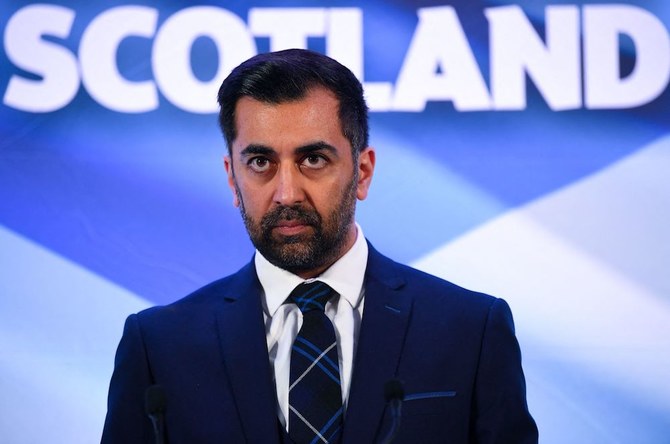EDINBURGH: Humza Yousaf, the first Muslim leader of a major UK political party, faces an uphill battle to revive Scotland’s drive for independence following the long tenure of his close ally Nicola Sturgeon.
The new and youngest Scottish National Party (SNP) leader, 37, says his own experience as an ethnic minority means he will fight to protect the rights of all minorities.
The Glasgow-born Yousaf took his oath in English and Urdu when he was first elected to the Scottish Parliament in 2011, before progressing to become the first Muslim to serve in the devolved government’s cabinet.
He has been hailed by his supporters as a polished communicator who can unite the party as support stagnates for the SNP’s central policy — independence for Scotland.
Despite the UK government’s opposition to a new referendum, and a Supreme Court setback, Yousaf vowed in his victory speech Monday to deliver independence in this generation.
And, as his wife and mother brushed away tears, he paid tribute to his paternal grandparents after they came to Scotland from Pakistan in the 1960s barely speaking English.
They would not have imagined “in their wildest dreams” that their future grandson would become the leader of their adopted homeland.
“We should all take pride in the fact that today we have sent a clear message: that your color of skin or indeed your faith is not a barrier to leading the country that we all call home,” Yousaf said.
He also vowed to be his own man as Scotland’s first minister. But far from running away from Sturgeon’s controversial record, he also says he will keep his experienced predecessor on “speed dial” for advice.
That has fed into critics’ portrayal of Yousaf as a political lightweight who will remain in thrall to Sturgeon’s camp.
At the same time, he is promising a more collegial style of leadership. “Mine would be less inner circle and more big tent,” he told LBC radio.
With the independence push stymied for now, following Sturgeon’s more than eight-year tenure as first minister, Yousaf takes over facing crises in health care and education under the SNP’s own watch in Scotland.
His record as Sturgeon’s minister for justice and health care was savaged on the campaign trail by his chief rival, Kate Forbes, and Yousaf must also heal a fractured party after its bruising leadership election.
Yousaf says he was toughened after facing racist abuse growing up in Glasgow, especially after the 9/11 attacks in the United States.
“I’ve definitely had tough times,” he recalled, reflecting on his time in politics.
“I’ve thought to myself, ‘goodness, is there more that I can take personally’ because I also come under a tremendous amount of abuse online and, unfortunately, sometimes face to face.”
Yousaf’s Pakistani-born father forged a successful career in Glasgow as an accountant. The new SNP leader’s mother was born into a South Asian family in Kenya.
Yousaf attended an exclusive private school in Glasgow, two years behind Scottish Labour leader Anas Sarwar.
He studied politics at Glasgow University, and worked in a call center before becoming an aide to Sturgeon’s predecessor as SNP leader and first minister, Alex Salmond.
Yousaf entered the Scottish cabinet in 2012, serving in various roles including justice, transport and most recently health.
He married former SNP worker Gail Lythgoe in 2010, but they divorced seven years later.
In 2021 he and his second wife Nadia El-Nakla launched a legal complaint against a nursery, accusing it of racial discrimination after it denied admission to their daughter.
The complaint was upheld by education inspectors but the couple have now dropped it, and the nursery denied the accusations.
He was accused of deliberately skipping a Scottish vote to legalize gay marriage in 2014, due to pressure from Muslim leaders.
Yousaf insisted he had a prior engagement, and contrasts his own record to Forbes’ religiously conservative views as a member of a Scottish evangelical church.
He says he will “always fight for the equal rights of others” and not legislate based on his own faith.
But one person’s constitutional position will not be protected in a Yousaf-led Scotland — that of King Charles III.
“I’ve been very clear, I’m a republican,” he told Scottish newspaper The National, calling for debate on whether Scotland should move to an elected head of state.
Humza Yousaf becomes Scotland’s first Muslim leader
Short Url
https://arab.news/m9f8k
Humza Yousaf becomes Scotland’s first Muslim leader

- Glasgow-born Yousaf took oath in English and Urdu when first elected to Scottish Parliament in 2011
- Yousaf vowed in victory speech Monday to deliver independence in this generation













